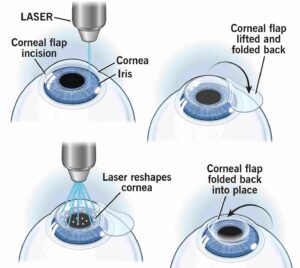If you are considering having LASIK surgery, it is important to be aware of the potential side effects that can occur after the procedure. One common side effect is blurred vision. In this blog post, we will discuss what can cause blurred vision after LASIK and how to deal with it. We will also provide some tips on how to reduce your risk of experiencing this side effect.
Contents
What Is Lasik?
 Lasik is a type of refractive surgery that is used to correct vision problems. It is a permanent solution for those who are nearsighted, farsighted, or have astigmatism. Lasik is a very popular procedure, and it has a high success rate. This type of surgery is generally very safe, but there are some risks involved.
Lasik is a type of refractive surgery that is used to correct vision problems. It is a permanent solution for those who are nearsighted, farsighted, or have astigmatism. Lasik is a very popular procedure, and it has a high success rate. This type of surgery is generally very safe, but there are some risks involved.
The process of Lasik is very simple. First, the doctor will create a flap in the cornea. Then, they will use a laser to reshape the cornea. Finally, the doctor will put the flap back in place and allow it to heal. Most people who have Lasik surgery experience little to no pain afterward.
If you are considering Lasik surgery, it is important to have realistic expectations. Lasik can correct your vision, but it will not perfect it. Consult with a professional to get a better idea of what you can expect from the surgery.
How Blurred Vision After Lasik Feel Like?
Generally, Lasik is considered successful surgery. But like any other surgery, there are certain risks and side effects associated with it. One of the most common side effects is blurred vision.
For some people, this blurred vision may only be temporary and will eventually go away on its own. However, for others, the blurriness may be permanent. Blurriness feels different for everyone. Some people may only experience it when they look at faraway objects, while others may feel it all the time.
For example, if you have blurry vision after Lasik, you may:
- Have difficulty reading or seeing clearly up close
- Feel like your eyes are strained or tired
- Notice that your vision is more blurry at night
- See double or have multiple images in one eye
- Have trouble seeing fine details
These things might seem minor, but they can have a big impact on your daily life. If you’re struggling with blurred vision after Lasik, talk to your doctor. However, if it is for a short period of time, it is nothing to worry about.
What Causes Blurry Vision After Lasik?
 There are a few different things that can cause your vision to be blurry after Lasik surgery. Let’s take a look at a few of the most common causes.
There are a few different things that can cause your vision to be blurry after Lasik surgery. Let’s take a look at a few of the most common causes.
Dry eye syndrome
One of the most common causes of blurry vision after Lasik is dry eye syndrome. This occurs when your eyes don’t produce enough tears, or when your tears evaporate too quickly. This can cause your eyes to feel scratchy, irritated, and watery. You may also have trouble wearing contact lenses.
Improper healing process
Another common cause of blurry vision after Lasik is an improper healing process. This means that your eyes don’t heal correctly after the surgery, which can result in blurred vision. In some cases, this can be due to a complication during the surgery itself. This can also be caused by an infection or inflammation.
Incorrect corneal flap
Another common cause of blurry vision after Lasik is an incorrect corneal flap. This occurs when the cornea (the clear, outer layer of the eye) is not cut correctly during the surgery. This can result in a misshapen cornea, which can cause blurry vision. However, this is a very rare complication, occurring in less than one percent of all Lasik surgeries.
Certain medications
Sometimes, the cause of blurred vision after Lasik can be attributed to certain medications that you may be taking. If this is the case, your best course of action is to speak with your doctor and see if there are any alternative medications that you can take.
Central serous retinopathy
This is a condition that usually affects young to middle-aged men. It occurs when fluid builds up under the retina, causing it to detach from the back of the eye. This can lead to blurred vision. However, it happens in rare cases and usually goes away on its own. In fact, most people who have this condition don’t even know they have it.
So, these are common causes that can lead to blurred vision after Lasik surgery. If you experience any of these, make sure to contact your doctor immediately. And lastly, don’t forget to give your eyes some time to heal and adjust after the surgery. With proper care and rest, your vision will eventually clear up.
Other Risks Involved In Lasik Surgery
 As we are all aware, there are always risks involved when we undergo any kind of surgery. Lasik surgery is no different and patients should be made aware of the potential risks before they decide to go ahead with the procedure.
As we are all aware, there are always risks involved when we undergo any kind of surgery. Lasik surgery is no different and patients should be made aware of the potential risks before they decide to go ahead with the procedure.
One of the common risks is blurred vision after Lasik that we have discussed. Now, let’s outline some of the other risks that are associated with this type of surgery.
The most common side effect after Lasik surgery is dry eyes. This usually lasts for a few weeks but can occasionally persist for longer periods of time. In some cases, patients may experience chronic dry eyes which can be a very debilitating condition.
Another risk is the development of visual aberrations. This means that your vision may not be as crisp and clear as it was before surgery. You may also experience halos or glares around bright lights.
There is also a small risk of developing serious complications such as:
- Infection
- Inflammation
- Bleeding inside the eye
These complications can lead to vision loss so it is important to be aware of them and to seek medical help if you experience any of these symptoms. Before undergoing Lasik surgery, make sure that you discuss all of the risks with your surgeon so that you can make an informed decision.
How To Manage Blurred Vision After Lasik?
When you first get Lasik, your vision will be a bit hazy and blurred. This is normal and will improve within the first few days. However, if you experience blurred vision after Lasik that lasts longer than a week, there are a few things you can do to help improve it. These include:
Wearing eyeglasses
It is important to wear eyeglasses or sunglasses when outdoors, especially during the first few weeks after Lasik. This will help protect your eyes from the sun and wind, which can cause irritation and dryness.
Using artificial tears
If your eyes feel dry or irritated, using artificial tears can help. Be sure to use a sterile product that is safe for use after Lasik. After Lasik surgery, it is important to keep your eyes hydrated and lubricated. This will help your eyes heal and improve your vision.
Resting your eyes
It is important to rest your eyes after Lasik surgery. This means avoiding activities that require you to use your eyes for extended periods of time, such as reading or using a computer. Taking breaks often and getting enough sleep will help your eyes heal and reduce irritation and blurred vision. For example, take a 15-minute break every hour when working on the computer.
Avoiding rubbing your eyes
This is probably the most important thing you can do to prevent further irritation and damage. Remember that your eyes are still healing, and rubbing them can cause serious problems. If you must touch or rub your eyes, be sure to wash your hands thoroughly first. Because it can be difficult to keep your hands away from your eyes, you may want to wear sunglasses or protective eyewear to avoid accidentally touching or rubbing them.
Maintaining healthy lifestyle
 Along with other health-related issues, you should maintain a healthy lifestyle to improve your vision. This means eating nutritious foods, exercising regularly, and getting enough sleep. Because what we eat and how we live affects our overall health, it also impacts our vision.
Along with other health-related issues, you should maintain a healthy lifestyle to improve your vision. This means eating nutritious foods, exercising regularly, and getting enough sleep. Because what we eat and how we live affects our overall health, it also impacts our vision.
So these are tips that you can self-manage your blurred vision after Lasik. But of course, if the problem persists, it’s best to visit your eye specialist for a professional assessment and management. This is especially important if you experience sudden or severe blurred vision, as this could be a sign of a more serious underlying condition.
If you’re experiencing any type of vision problem, it’s always best to consult with an eye specialist to rule out any serious causes. And if you’ve had Lasik surgery, be sure to follow up with your surgeon as recommended to ensure that your vision stays on track.
Conclusion
To conclude blurred vision after Lasik is a common side effect that usually goes away within a few days or weeks. However, if you experience blurred vision that does not improve, it is important to see your eye doctor for an evaluation. There are treatments available that can help improve your vision.
If you have recently had Lasik surgery and are experiencing blurred vision, contact your eye care specialist. They will be able to provide you with the best course of treatment.
For more information and guidance, please reach out to Eye Mantra. EyeMantra offers the most advanced Lasik options including PRK, Femto Lasik, SMILE surgery, Standard Lasik, and Contoura vision. If you have any questions on Lasik surgery, Lasik surgery cost, and Lasik procedure, call us at +91-9711116605 or email at [email protected].


